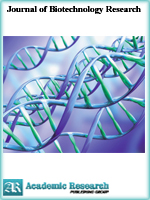Journal of Biotechnology Research
Online ISSN: 2413-3256
Print ISSN: 2413-8878
Print ISSN: 2413-8878
Quarterly Published (4 Issues Per Year)

Archives
Volume 2 Number 12 December 2016
Molecular Mechanisms of Antimicrobial Resistance in Bacteria of Public Health Important
Authors: Chijioke A. Nsofor
Pages: 92-100
Abstract
Antibiotics underpin modern medicine; their use has reduced childhood mortality and increased life expectancy, and they are crucial for invasive surgery and treatments such as chemotherapy. However, the emergence of antimicrobial resistance has become a problem of public health concern both in developed and developing countries. There are different mechanisms by which bacteria are either intrinsically resistant or acquire resistance to available antimicrobials. These include prevention of access to drug targets, changes in the structure and protection of antibiotic targets, direct modification or inactivation of antibiotics, mutagenesis of key amino acids in the macromolecular targets of specific chemotherapeutics, or drug efflux from the cell, among others. All these mechanisms are encoded by several genes and other genetic elements, many of which can transfer between bacteria. Also, new resistance mechanisms are constantly being described, and new genes and vectors of transmission are identified on a regular basis. This article reviews the molecular mechanisms of drug resistance in bacteria of public health importance including Mycobacterium tuberculosis, Pseudomonas aeruginosa, Escherichia coli, Klebsiella pneumoniae, Staphylococcus aureus, Vibrio cholerae and Neisseria gonorrhea.



